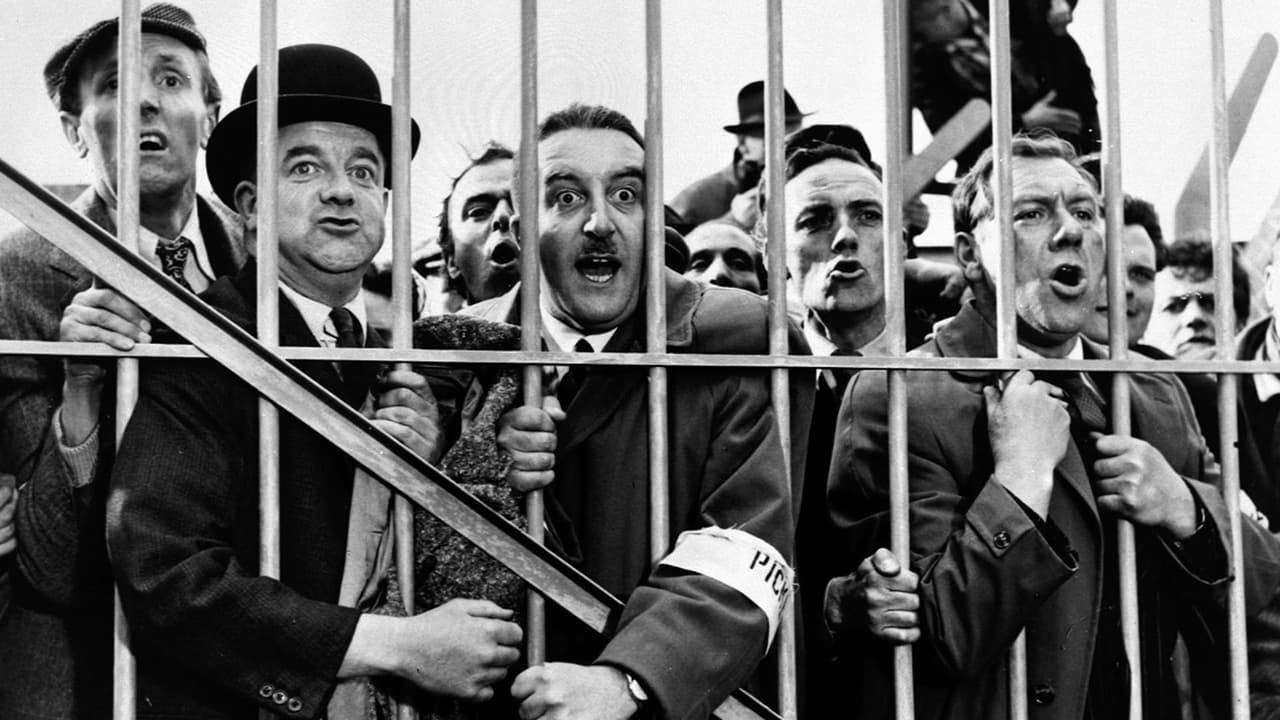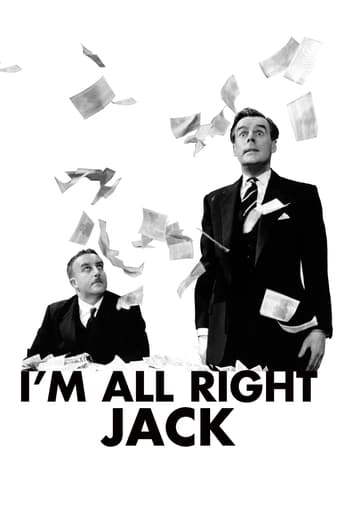

Once again, from, more or less, the last decade of quite serious films, in black and white, we have what may be described as a "sleeper" similar to the American film from that period, A Face in the Crowd. Perhaps like Gulliver's Travels, on the surface we have comedy, but fundamentally, a deepest insight? A significant point that can be made is that to this day, the differences between management and employees seems to be the issue; but nobody wants to consider that maybe they are to a considerable extent, both wrong, and the actor Ian Carmichael, until the end, affable; unexpectedly and gloriously shows us, in the finale, what may very well be wrong.One way to see what is wrong is to consider the track records of economic swings throughout the century just gone by, the twentieth century. Under Franklin Roosevelt, the American economy went up, but during and after Ronald Reagan it is still going down. For example, before he shut down the Interstate Commerce Commission, semi-truck drivers were allowed adequate sleep times, were well paid, and generally courteous on the road. Since then, a disaster. In Britain, almost as predicted by this film, the media during 1984 scoffed at the coal miners, whose work conditions were otherwise shall we say, always deplorable.This whole situation, moving from the American situation to the situation, European style, is really quite simple. During the 1960's and 1970's the recovery from World War II, the European Economic Miracle took place. Then, Margaret Thatcher came along, and now it is 2013.
... View MoreAnyone who thinks Old British films are 'quaint' should watch this, one of the sharpest satires ever made. A finer film on industrial relations has never been made and I doubt could be made now in the current climate of intellectual dishonesty. The film makers do not take the easy route in blaming one party or another but holds them all up to scrutiny. The bosses, the unionists, the clients are all (rightly) shown as self motivated and cynical. Fred Kite is a character very familiar even in modern British politics (Bob Crowe still thinks and talks very much like him), with his hilariously Utopian views on the impoverished horror state of the USSR "fields of corn and ballet in the evening". The bunkum of the bosses is hardly less true and delightful to behold.
... View MoreThis is frequently biting, often just funny, but overall it is more sad commentary.I am reminded of an Associated Press photo from about 1987. The Saturn plant in Spring Hill, Tennessee, had just voted -- again -- to turn down the unionizing effort of the United Auto Workers. Employees were quoted as saying this was a victory for the workers.Writing in the spring of 2009, just a few days after Chrysler has announced its bankruptcy, and after meeting in my current geographical location, time after time, people who had fled Detroit carrying horror stories of union corruption and, face it, complicity by industry and management, I wonder if we will ever have civilization and a sound economy again."I'm All Right Jack" manages to paint a sadly accurate picture of a culture perfectly spelled out by the Stanley character when he throws the Marxian motto of "From each ..." into the face of the Kite character, the union steward -- beautifully played, by the way, by the brilliant Peter Sellers.What isn't spelled out, but ought to be obvious to any thinking viewer, is that the evils of the situation portrayed in "I'm All Right Jack" don't come from corrupt management or corrupt unions alone but from an acceptance of and institutionalization of the principle of coercion.Let me stress that one can watch "I'm All Right Jack" with your thinking process turned off and you can just enjoy the superlative acting and the funny situations, but I urge you to think, to understand there really is an important point being made, even if not one the makers themselves necessarily intended.
... View MoreIf it hadn't been for the fact that a similar (though less cynical) film had been made just a few years earlier (THE MAN IN THE WHITE SUIT), I might have scored this parody a bit higher. Despite obviously being a comedy, the film is an amazingly insightful attack on the floundering state of British labor following the Second World War. While Britain used to be the most productive country on the planet, during this era they were torn apart by strikes and work slowdowns. Yet the film doesn't just attack labor unions with their unreasonable demands and poor work ethic. It also attacks factory owners who actually exploit this to their own interests. This film is obviously a loud declaration that the British Empire is in fact dead.The film begins with an upper class twit named 'Windrush' going to work for the first time. However, he really isn't cut out for management despite his Oxford education--and he seems better suited to manual labor. The problem is that after failing again and again in management, he is simply too good as a blue collar worker. This is because he works way too hard and makes all his extremely lazy co-workers look bad! And, when management documents how much work one motivated man CAN do, this ultimately results in a strike, as management wants the workers output to increase--or at least that's what they claimed. All this set in motion by a slow-witted but very decent upper class gent working as a forklift driver!! The film is very well written and clever. While younger audience members might not appreciate the film's insights, it is funny in a droll sort of way. Additionally, having wonderful actors such as Peter Sellers and Terry-Thomas sure didn't hurt! Overall, sharp social and political satire that does a great job of attacking labor and management and giving insights into the decline of the British economy.
... View More